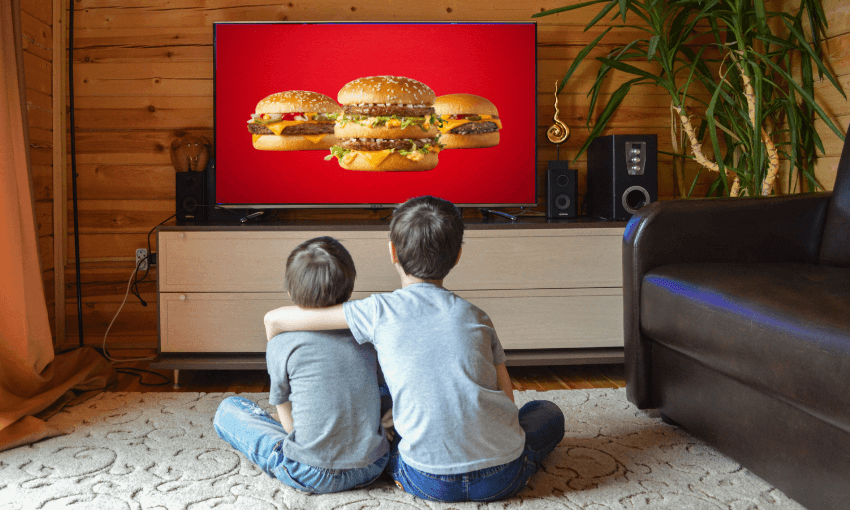With a health crisis driven by preventable illnesses, the government can take one big step now.
Last month the UK government banned junk food ads on TV before 9pm, while online ads for the same products have been banned outright. It’s the latest and most profound move in the UK to restrict unhealthy food and sugary drink marketing to kids that started with a 2019 ban on ads throughout London’s transport network.
It’s a move designed to lift pressure from the public health system – the NHS – following a damning report concluding it was in a “critical condition”. Meanwhile in New Zealand there is no sign of government action to address exactly the same problem.
Our health system is very clearly struggling to cope with huge pressures – including preventable illnesses related to diets high in salt, fat and sugar. New Zealand kids are drowning in junk food and sugary drink marketing. They see it on their screens, at sporting events, in classrooms and in neighbourhoods where they hang out with friends. It’s virtually impossible for children and teenagers to limit their intake of junk food when high consumption has been normalised through a constant flow of advertising.
Every parent who has ever been to the supermarket will be unsurprised by results from a recent Australian study showing marketing to kids directly results in children pestering their parents to purchase unhealthy food and fizzy drinks for them. Companies target kids because they understand that taste preferences and dietary patterns formed in childhood carry through into adulthood; “a satisfied customer today is a loyal customer tomorrow” as they say. These companies recognise the significant impact children’s dietary preferences have on overall household purchasing and adult eating choices too.
Growing up in the 90s I had a great love for after-school TV shows and to this day, old TV ad jingles bring back feelings of nostalgia… the milky bars are on me! The snacks I demanded for my lunchbox (nutrient-free and sugar-ladened favourites included Tiny Teddies, Roll Ups and Le Snaks) became household staples for Mum and Dad too.
Fast forward to 2024 and harmful marketing on TV is even more entrenched, gamified and bolstered by sophisticated online marketing driven by algorithms and personal data.
The end result of all this is diets high in junk food and fizzy drinks which increase the risk of developing a variety of ill-health conditions including digestive issues, cardiovascular disease, diabetes, poor oral health and mental health problems. When one in 10 children in New Zealand are having teeth removed due to tooth decay and more children and young people are being diagnosed with Type 2 diabetes, it’s more important than ever to protect them from harmful advertising and support access to nutritious diets.
Our health system is under extreme pressure with direct healthcare costs related to poor diets estimated at $2 billion per year. If our government fails to act on junk food marketing, it is choosing to prioritise the profits of transnational corporations over people. Why should New Zealand taxpayers bear the cost of ill-health created by these commercial entities that face no restrictions on the marketing of products that cause such harm?
The government has laid out an apparent commitment to prevention in its Policy Statement on Health 2024-2027, stating it needs to be proactive in responding to preventable diseases by addressing modifiable risk factors including poor nutrition. Indeed, the word prevention is mentioned 45 times in the document. It’s great the government recognises the problem and the solutions needed – but without any action the words ring hollow.
Health Coalition Aotearoa, along with health experts nationwide, have provided copious amounts of evidence that action to restrict junk food and sugary drink marketing to kids is needed now. Governments overseas are listening to the evidence and acting. Why aren’t we? New Zealand has no mandatory, enforceable regulations that prevent junk food and sugary drink companies from directly targeting children. And research I’ve led has shown repeatedly that voluntary, industry-led guidelines don’t work. The advertising codes we have right now are voluntary and toothless. Even if companies promise to abide by them, no one is checking to make sure they do and there are no penalties if they don’t.
The UK example shows there are measures at our disposal, it just takes political will to put them in place. The New Zealand public wants to protect children from this marketing and the government says it’s committed to prevention – all that’s left is to do it.

